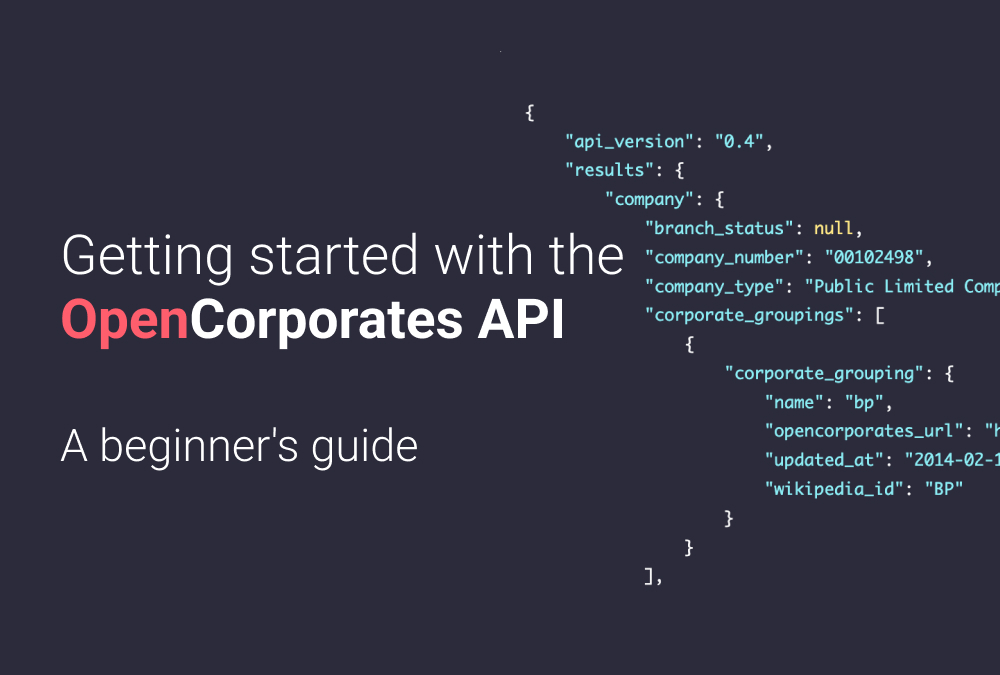The OpenCorporates API is an invaluable resource for anyone interested in corporate transparency and data analysis. It aggregates company registries from around the world, providing users with access to vast amounts of corporate data. This guide will walk you through the essentials of using this powerful tool.
By following the money, researchers and journalists can uncover the hidden relationships between companies and individuals, thus enhancing their investigative efforts. In this article, we will explore how to effectively utilize the OpenCorporates API.
What is an API and why use one?
An API (Application Programming Interface) is a set of rules and protocols that allows different software applications to communicate with each other. In the context of OpenCorporates, the API enables users to access and manipulate data efficiently.
Utilizing an API can streamline your research processes, making it easier to gather data without manual searches. This is particularly useful for accessing large datasets, such as those available through OpenCorporates, which contains records of millions of companies globally.
Furthermore, APIs allow for automation, meaning you can set up scripts to pull data at regular intervals or based on certain criteria, increasing your productivity. OpenCorporates API for investigative journalism provides a structured and organized way to conduct research into corporate relationships and structures.
How to set up your free OpenCorporates account?
Setting up a free account with OpenCorporates is straightforward. First, visit the OpenCorporates website and click on the “Sign Up” button. You’ll need to provide basic information, such as your email address and a password.
Once registered, you will receive an activation email. Click the link in the email to activate your account. After activation, log in to your account and navigate to the API section to obtain your API key.
Your API key is crucial as it acts as your unique identifier for accessing the OpenCorporates API. Make sure to keep it confidential to prevent unauthorized usage of your account. Additionally, familiarize yourself with the documentation provided by OpenCorporates to understand the different endpoints and data available.
Which method should you choose for accessing data?
OpenCorporates offers several methods for data access, primarily through REST API calls. Depending on your needs, you can use URL query parameters to filter data. The main methods include:
- GET requests: To retrieve data on companies or individuals.
- POST requests: For sending data to the API, though less common for most users.
- Search endpoints: Allow you to find specific companies based on names or registration numbers.
Each method has its own use cases. For instance, if you need detailed information about a specific corporation, a GET request targeting that company’s unique identifier can yield comprehensive data.
Understanding how to structure your requests is vital. Review the API documentation for examples and best practices to ensure efficient data retrieval. This knowledge will empower you to navigate the OpenCorporates API effectively.
How to retrieve data for one company using the OpenCorporates API?
Retrieving data for a specific company using the OpenCorporates API is a simple process. You will need the unique identifier for the company, which you can find on the OpenCorporates website.
Once you have the identifier, construct your API call using the following structure:
Replace {company_id} with the actual ID of the company you wish to query. Upon making this call, you will receive a JSON response with detailed information about the company, including its officers, associated filings, and corporate relationships.
It’s important to handle the API responses properly. Ensure you check for any errors in the response, such as invalid IDs or network issues, to enhance your user experience and avoid confusion.
What are the best practices for using the OpenCorporates API?
To maximize your effectiveness when using the OpenCorporates API, consider implementing the following best practices:
- Rate Limiting: Be mindful of the API’s rate limits to avoid being blocked from making further requests.
- Data Validation: Always validate the data you receive to ensure its accuracy and relevance to your research.
- Error Handling: Implement error handling in your scripts to manage issues gracefully.
- Documentation Reference: Regularly refer to the OpenCorporates API documentation for updates and new features.
By following these best practices, you can ensure a smoother experience and improve the quality of your investigative outcomes when utilizing the OpenCorporates API.
What common challenges might you encounter when using the API?
While using the OpenCorporates API, you may encounter several challenges. One common issue is understanding the data structure, which can be complex. Users often struggle with how to interpret JSON responses correctly.
Another challenge is the potential for incomplete data. Not all companies are registered in every jurisdiction, which can lead to gaps in the information you receive. Cross-referencing with other databases like Open Sanctions or OCCRP Aleph can help fill these gaps.
Additionally, users may experience limitations related to rate limiting, which restricts the number of requests you can make in a given timeframe. Plan your data retrieval accordingly to manage these limitations effectively.
How can you enhance your investigative strategies with OpenCorporates?
The OpenCorporates API is a powerful tool for enhancing investigative strategies, especially in the realm of corporate transparency. By utilizing this API, you can uncover intricate networks of companies and their connections, which is vital for thorough investigations.
For instance, you can cross-check company data with financial records, helping to identify potential fraud or misconduct. This cross-referencing capability is crucial for investigative journalism, especially when exploring complex corporate structures.
Furthermore, aggregating data from OpenCorporates with insights from other platforms can provide a more comprehensive view of the corporate landscape, enabling you to form well-rounded conclusions about the entities you are studying.
Related questions about OpenCorporates API usage
Questions related to understanding the OpenCorporates API
What is OpenCorporates?
OpenCorporates is a comprehensive database that consolidates corporate information from various jurisdictions worldwide. It aims to enhance corporate transparency by providing access to detailed company records, including ownership structures and corporate relationships.
This platform is especially useful for researchers, journalists, and anyone interested in uncovering the complexities of company operations. By leveraging its extensive database, users can conduct thorough investigations into corporate practices.
How can I get started with the OpenCorporates API?
To get started with the OpenCorporates API, you first need to create a free account on their website, as previously mentioned. After setting up your account, obtain your API key, which is essential for making requests to the API.
Familiarize yourself with the API documentation, which provides important guidelines on how to structure your queries and interpret the responses. This foundational knowledge will be crucial as you begin working with the API for your research.
What are common use cases for the OpenCorporates API?
The OpenCorporates API can be used for various purposes, including:
- Investigative journalism: To uncover hidden corporate relationships.
- Market analysis: For examining competition and market dynamics.
- Compliance checks: To ensure companies meet regulatory standards.
These use cases highlight the versatility of the OpenCorporates API in facilitating comprehensive data analysis, crucial for informed decision-making.
What challenges might I face when using the OpenCorporates API?
Users may face challenges such as understanding the intricacies of the API’s data structure and managing rate limits. Moreover, the potential for incomplete data can complicate your research efforts.
It’s essential to implement strategies like cross-referencing data with other databases and adhering to best practices for API usage to overcome these challenges effectively.
How does OpenCorporates compare to other APIs like Crunchbase and SEC EDGAR?
While OpenCorporates focuses on global company data from various registries, Crunchbase primarily concentrates on startup and investment data, making it more suitable for venture capitalists and entrepreneurs.
SEC EDGAR, on the other hand, specifically targets public company filings within the United States. Each API has its strengths, and your choice should depend on the specific data needs of your research.




